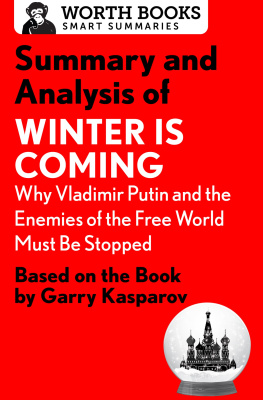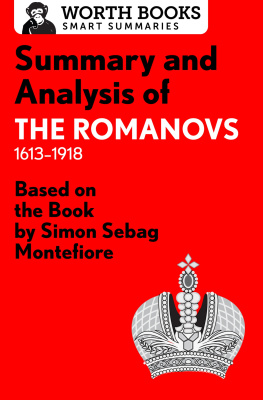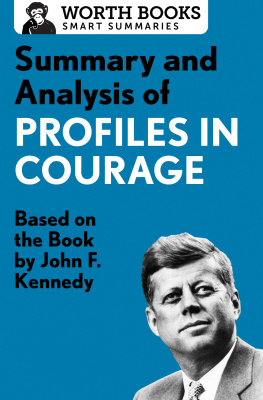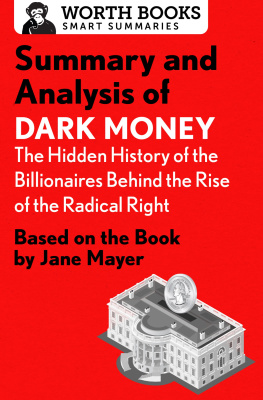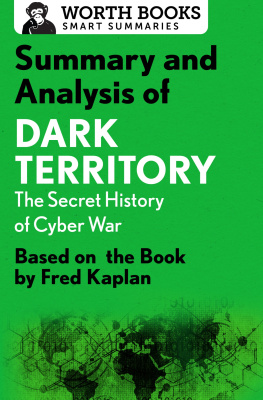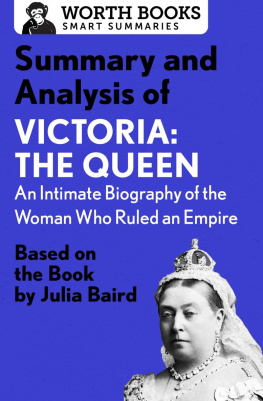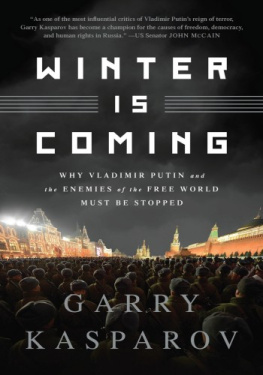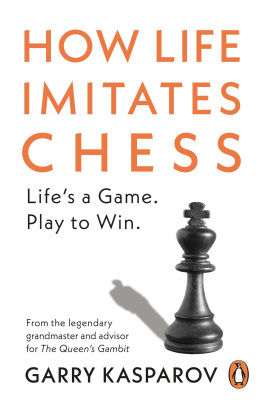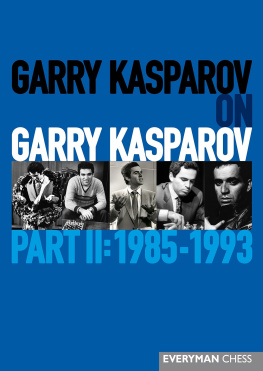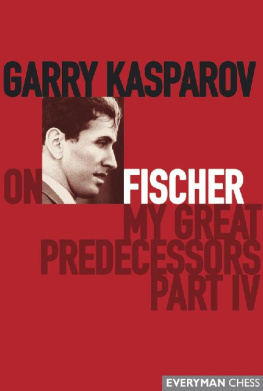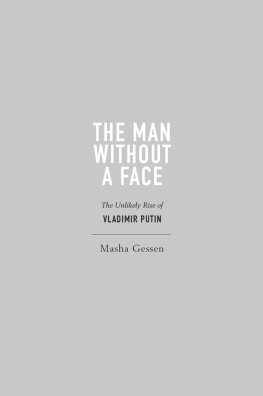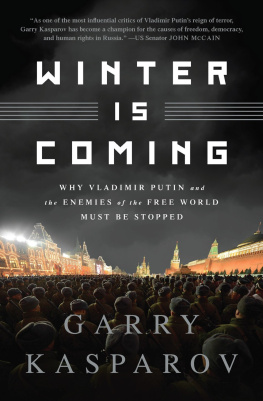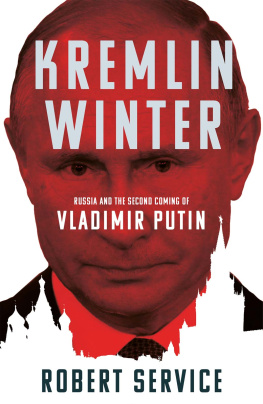Sign up for our newsletter to discover more ebooks worth reading.
EARLY BIRD BOOKS
FRESH EBOOK DEALS, DELIVERED DAILY
LOVE TO READ ?
LOVE GREAT SALES ?
GET FANTASTIC DEALS ON BESTSELLING EBOOKS DELIVERED TO YOUR INBOX EVERY DAY!
Summary and Analysis of
Winter Is Coming
Why Vladimir Putin and the Enemies of the Free World Must Be Stopped
Based on the Book by Garry Kasparov
The summary and analysis in this ebook are meant to complement your reading experience and bring you closer to a great work of nonfiction. This ebook is not intended as a substitute for the work that it summarizes and analyzes, and it is not authorized, approved, licensed, or endorsed by the works author or publisher. Worth Books makes no representations or warranties with respect to the accuracy or completeness of the contents of this ebook.
Contents
Context
In Winter Is Coming , retired Russian chess champion and current chairman of the Human Rights Foundation Garry Kasparov paints a troubling picture of conditions in Vladimir Putins Russia, where government funds are funneled to the presidents oil tycoon cronies and opposition activists are imprisonedand often die under suspicious circumstances. The actions of Putin and his administration are under sharper scrutiny after the election of US President Donald Trump, a man who has repeatedly expressed his admiration for the president of the Russian Federation.
With claims of Russia hacking the United States 2016 election, possible conflicts of interest for various politicians and cabinet members, and potentially inappropriate contacts between American leadership and those in power in the Russian Federation, Vladimir Putin remains front and center in American politics and on the world stage.
If the United States, the North Atlantic Treaty Organization (NATO), and the United Nations (UN) fail to stop Putin, he will continue his authoritarian rule and his expansionist designs. Garry Kasparov articulates several feasible strategies for curtailing these ambitions, including sending troops to defend Ukraines sovereignty and ending all further engagement with Russia via economic and travel sanctions.
Overview
Garry Kasparov begins Winter Is Coming with a short history of the dissolution of the Soviet Union and Russias flirtation with democracy before outlining the rise of Vladimir Putin, a former KGB operative and deputy prime minister to Boris Yeltsin. When Yeltsin resigned in 1999, Putin, who was well regarded by the Russian people for his leadership during the recent war with Chechnya, was made acting-president before being officially elected in 2000.
The early years of his reign were marred by two botched hostage negotiations involving Chechen separatists, one in a Moscow theater in 2002 and another in 2004 at a school in Beslan, North Ossetia. Russian troops at both sieges killed hundreds of innocent hostages.
In 2008, after Putin had served two terms, his prime minister, Dmitry Medvedev, was elected president, though it was widely understood that Putin was still in chargea belief that was cemented when, in 2012, Putin was elected to a third presidential term (amid accusations of voter fraud).
Since then, Putin has been actively suppressing his political opponents with imprisonment and (allegedly) murder while continuing his propensity to invade and conquer by annexing Crimea in 2014. Despite this direct attack on a sovereign nation, and the shooting down of a commercial flight over Ukraine in 2014, the international community has yet to intervene in any meaningful way. Kasparov chronicles his own experience as a lifelong Russian pro-democracy activist, including details of his two arrests and the harassment he faced from Putins lackeys, resulting in his choice to live in the United States.
As a native of Azerbaijan who remembers Communism under the Soviet Union, as well as Russias brief foray into democracy under Boris Yeltsin, Kasparov provides essential background on the vacuum that allowed Putins rise to power
Kasparov articulates several feasible strategies for the international community to inhibit Putins tyranny, including the aforementioned options of sending troops to defend Ukraines sovereignty and ending economic and travel sanctions, which would hit Putin and his oligarch friends where it hurts: their wallets. Otherwise, Kasparov posits, Vladimir Putin will continue warring with neighbors, committing human rights violations, and selling weapons to unstable nations in the Middle East to drive up the price of oil. As long as the world continues to treat him as a legitimate leader, Putins despotic reign will persist.
Summary
Introduction
Garry Kasparov introduces himself as a former Russian chess champion and current chairman of the Human Rights Foundation before beginning a brief outline of the current situation in Russia. In August of 1991, Communists struggling against the downfall of their belief system in the Soviet Union staged an unsuccessful coup against president Mikhail Gorbachev. At the time, the Soviet peoples overall unwillingness to support the coup was seen as the beginning of democracy in Russia. Yet, just eight years later, Vladimir Putin, a former KGB lieutenant, was elected president.
Despite Putins obvious corruption, subversion of democracy, and bullying of neighboring countries, the Western world continues to appease him, largely because of a dependence on Russian oil. The 2008 election of Putin successor Dmitry Medvedev would have been an excellent opportunity to end this charade, as the election was a sham in which Putin and Medvedev merely switched jobs so that Putin could be reelected after Medvedevs term ended. Instead, the results of the election were accepted and treated as legitimate by an international community that supposedly disapproves of despotism. The years since have shown Putin growing bolder, culminating in the annexation of Crimea in 2014.
In what will be a major theme of the book, Kasparov calls on American and European governments to cease giving validation to Putins regime by discontinuing friendly relations and trade. He notes that Hitler was emboldened by the lack of international response in 1939, resulting in World War II.
Prologue
The collapse of the Soviet Union could have been a fresh start for Russia, but insiders and the world at large mismanaged the opportunity. Russia was permitted to keep its nuclear weapons and there were no trials or punishments of any kind for the Communist leaders whose reign had been defined by violent oppression and corruption. American President George H. W. Bush, a cautious pragmatist, tried to help Mikhail Gorbachev preach unity to the members of the Soviet Union in 1991, even warning the Ukrainians to be cautious in their push for freedom.
This passivity set the stage for the lack of intervention during Putins reign. The world has settled into a relationship of appeasement with Putin, in which he is either ignored or rewarded with lucrative trade deals. With no pushback, Putin has been free to do as he wishes, committing war crimes in Chechnya and completely shutting down the Russian free press. Putin ingratiated himself with President George W. Bush by being the first foreign leader to phone after the events of September 11, 2001, and President Barack Obama declared his wish to press a reset button on the relationship between the two nations.

